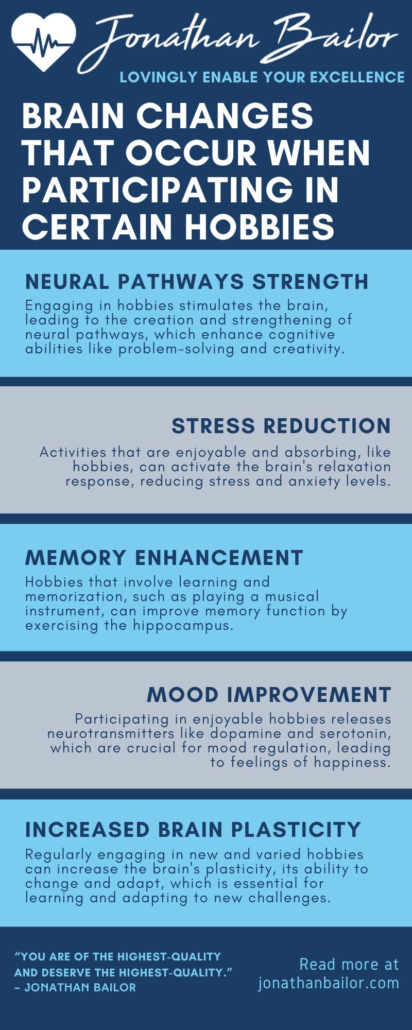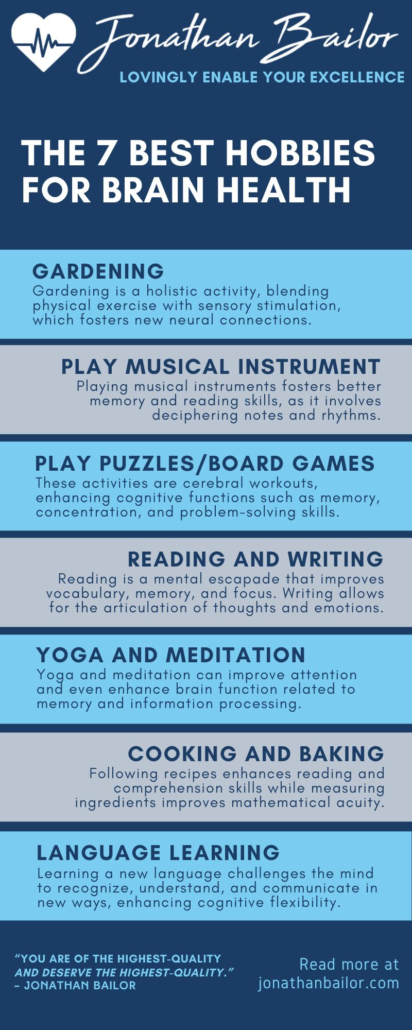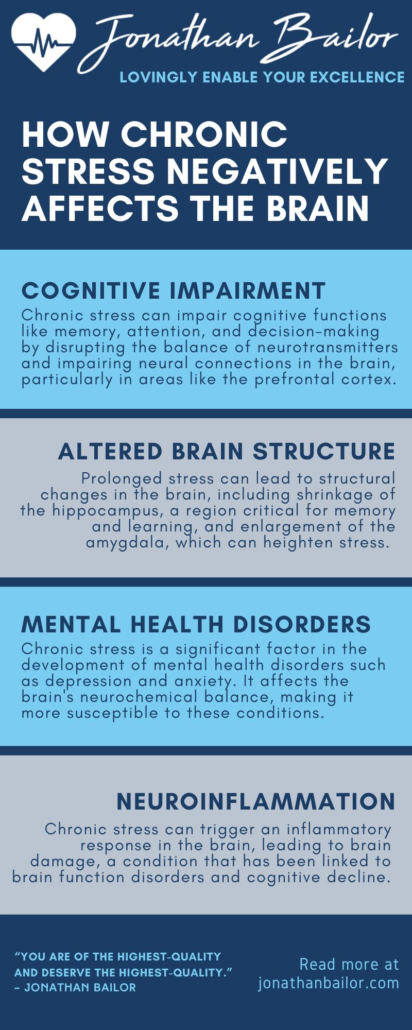7 Best Hobbies for Brain Health
Here are 7 of the best hobbies for brain health you probably didn’t know about until right now in this brain health guide with Jonathan Bailor.
Finding peace and enhancing our brain health might seem like a distant dream in a world constantly buzzing with information. But what if the secret to a vibrant mind lies in the simple pleasures of hobbies? Engaging in activities that feed the soul and challenge the brain isn’t just a delightful way to spend time; it’s a vital ingredient in maintaining cognitive vitality and mental health, especially as we journey through life’s later chapters.
If you enjoy brain health as much as we do make sure to check out our 28 Daily Habits to Support Long-Term Brain Health at Every Stage and 14 Brain Foods to Improve Memory and Focus guides next!
Hobbies are more than mere pastimes; they are gateways to mental rejuvenation. Each hobby weaves its own unique spell, fostering new neural connections, leading to increased brain plasticity, enhanced memory, and even warding off age-related cognitive decline. Essentially, hobbies increase your mental abilities. Imagine each activity as a loving caretaker of your brain, gently nurturing it to flourish and thrive.
The beauty of hobbies is their universality. Regardless of age or background, there’s a hobby that resonates with everyone. They are the unseen threads connecting us, fostering a sense of community and shared joy. When we indulge in these activities, we’re not just keeping the brain sharp; we’re participating in a shared human experience that transcends boundaries.
Sharing these experiences becomes an act of love and care. When you discover a hobby that lights up your world, it’s natural to want to spread that joy. Sharing your experiences through email or social media becomes more than just a post; it’s an invitation to your friends and family to embark on their journey of discovery and brain health.
Embracing hobbies for brain health is not just a solitary pursuit but a communal one. Each shared story, each recommendation becomes a beacon of hope and encouragement, inspiring others to explore and find their own paths to mental wellness. By sharing, you’re not just spreading information; you are cultivating a community of individuals with shared values of mental well-being and the joy of discovery.
As we jump into the world of hobbies for brain health, remember that this journey is as diverse as it is enriching. Each hobby offers a unique perspective and benefit, catering to different interests and abilities. The exploration is endless, and the rewards are immense. The magic of these hobbies lies not just in the activities themselves but in the shared experience and the joy of discovery that they bring. Let’s embark on this journey together, exploring the myriad ways hobbies can enhance our brain health and enrich our lives.

Feeling Better Is Priceless, That's Why We Don't Put A Price On It!
“It’s Like A Free and Medically Valid Version of Noom and Weight Watchers Online”
~ Dr. Doctor Matthew Oleshiak, MD
Click the 'LEARN MORE' button below for free lifetime access to the fast fix program developed by Jonathan and top Ivy League Medical Doctors
LEARN MOREP.S. It's not a free trial. It's not part of the program for free. The entire program is free, forever, for real! No credit card needed.
Nurturing the Mind: Top Hobbies for Enhanced Brain Health
Embarking on a journey to bolster brain health through hobbies is not only a fulfilling endeavor but also a transformative one. Each hobby, like that of a skilled artisan, shapes and fortifies the mind in its own unique way. They are not just activities but pathways to a richer, more resilient cognitive landscape. Let’s explore the diverse realms of hobbies that offer both enjoyment and profound cognitive benefits.
1. Gardening: Cultivating Mindfulness and Growth
Gardening is a serene dance with nature, a process that nurtures not just plants but our brains as well. As hands push into the soil, they not only plant seeds but also sow the seeds of mental clarity and stress reduction. The rhythmic nature of gardening activities, from watering to weeding, fosters a unique form of mindfulness that calms the mind.
It’s a holistic activity, blending physical exercise with sensory stimulation, which enhances fine motor skills and fosters new neural connections. The gratification of watching something grow from your efforts provides a profound sense of accomplishment, providing better mental health, boosting self-esteem, and combating symptoms of depression.
2. Playing Musical Instruments: Orchestrating Cognitive Symphony
Learning to play a musical instrument is similar to conducting a symphony within the brain. It’s a complex, enriching experience that demands coordination, concentration, and creativity. Playing musical instruments fosters better memory and reading skills, as it involves deciphering notes and rhythms.
It enhances hand-eye coordination and fine motor skills, engaging both hemispheres of the brain in a harmonious cognitive workout. For older adults, playing music can be a beacon for maintaining cognitive sharpness and even delaying the onset of dementia.
3. Puzzles and Board Games: Strategic Play for Mental Acuity
Engaging in puzzles and board games is like setting off on a thrilling adventure in the realm of strategic thinking and problem-solving. These activities are cerebral workouts, enhancing cognitive functions such as memory, concentration, and problem-solving skills.
They offer a playful yet effective way to slow cognitive decline and enhance mental flexibility. Engaging in these games with others also provides social interaction, which is crucial for mental well-being, and keeps loneliness and depression at bay.
4. Reading and Writing: Voyages in Creative Expression
Immersing oneself in the world of books and writing is akin to embarking on a journey of endless discovery and creativity. Reading exposes the brain to new ideas and perspectives, enhancing empathy and emotional intelligence. It’s a mental escapade that improves vocabulary, memory, and focus.
Writing, on the other hand, is a therapeutic and expressive outlet. It allows for the articulation of thoughts and emotions, fostering a deeper understanding of oneself and enhancing cognitive skills.
5. Yoga and Meditation: Harmonizing Mind and Body
Yoga and meditation are the twin pillars supporting a balanced and mindful existence. They are practices that connect the mind and body, fostering a state of tranquility and focus. Regular practice of yoga and meditation has been proven to effectively reduce stress and anxiety levels, improve attention, and even enhance brain function related to memory and information processing.
These practices provide a serene retreat from the hustle of daily life, promoting overall cognitive health.
6. Cooking and Baking: The Art of Culinary Creation
Cooking and baking are not just about preparing meals; they’re an art that stimulates the brain in multifaceted ways. Following recipes enhances reading and comprehension skills while measuring ingredients improves mathematical acuity.
The creative aspect of experimenting with flavors and textures boosts cognitive creativity and flexibility. Cooking is also a sensory-rich activity, engaging sight, smell, taste, and touch, which stimulates different areas of the brain.
7. Language Learning: Expanding Cognitive Horizons
Diving into the world of new languages is a robust exercise for the brain. Learning a new language challenges the mind to recognize, understand, and communicate in new ways, enhancing cognitive flexibility and problem-solving skills.
Language learning is known to improve memory, attention, and even multitasking abilities. It’s a journey that forges new neural pathways, not only expanding linguistic skills but also fostering an appreciation of different cultures, enriching the mind on multiple levels.
Incorporating these hobbies into our daily lives is a journey towards a healthier, more stimulated brain. They are not mere activities but lifelines to cognitive vitality and mental well-being.
As we engage in these hobbies, we weave a tapestry of enriched neural pathways, ensuring our minds remain as vibrant and dynamic as the hobbies we embrace.

Essential FAQs on Nurturing Your Brain Health
1. What are the primary factors that affect brain health?
A combination of lifestyle choices and environmental factors influences brain health. A nutritious diet, regular physical activity, mental stimulation, adequate sleep, and stress management play pivotal roles. Additionally, social engagement and emotional well-being significantly impact cognitive health.
Avoiding harmful habits like smoking and excessive alcohol consumption is also crucial for maintaining a healthy brain.
2. Can dietary choices improve cognitive function and prevent decline?
Yes, dietary choices have a profound impact on brain health.Eating foods that are high in antioxidants, good fats, vitamins, and minerals can give you energy and also help protect your brain from diseases.
Consuming a balanced diet with a focus on fruits, vegetables, fish, nuts, unsaturated oils, and plant sources of proteins can enhance cognitive function and may reduce the risk of cognitive decline.
3. How does physical exercise contribute to brain health?
Physical exercise is not just beneficial for the body but also for the brain. Regular physical activity can help increase blood flow to the brain, which in turn can boost memory, enhance learning, and improve your mood. So why not make exercise a part of your daily routine and start reaping the benefits today?
Engaging in regular physical activity, especially aerobic exercises, can boost brain function and act as a buffer against cognitive decline.
4. What is the connection between sleep and brain health?
Quality sleep is critical for brain health. During sleep, the brain removes waste products, consolidates memories, and repairs itself. Inadequate or poor-quality sleep can impair cognitive abilities, affect decision-making, and increase the risk of neurological disorders.
Aim for regular, restful sleep to support overall brain function and health.
5. Can stress have a long-term impact on brain health?
Chronic stress can have a detrimental impact on the brain, affecting memory and learning. It can lead to inflammation and changes in brain structure and function, particularly in areas involved in mood and emotion regulation.
Managing stress through mindfulness practices, relaxation techniques, and maintaining a balanced lifestyle is vital for preserving brain health.

Embracing a Journey of Cognitive Wellness
As we close this chapter on enhancing overall brain health through enriching hobbies and lifestyle practices, let’s carry forward the spirit of cognitive wellness. Sharing this journey with friends and family isn’t just about passing on information; it’s about nurturing a community dedicated to mental vitality.
We encourage you to share these insights on social media platforms and via email. Let’s create ripples of awareness and inspire our loved ones to embark on their paths to healthier, more vibrant minds. Together, we can foster a world where brain health is a shared and cherished goal.
Feeling Better Is Priceless, That's Why We Don't Put A Price On It!
“It’s Like A Free and Medically Valid Version of Noom and Weight Watchers Online”
~ Dr. Doctor Matthew Oleshiak, MD
Click the 'LEARN MORE' button below for free lifetime access to the fast fix program developed by Jonathan and top Ivy League Medical Doctors
LEARN MOREP.S. It's not a free trial. It's not part of the program for free. The entire program is free, forever, for real! No credit card needed.




